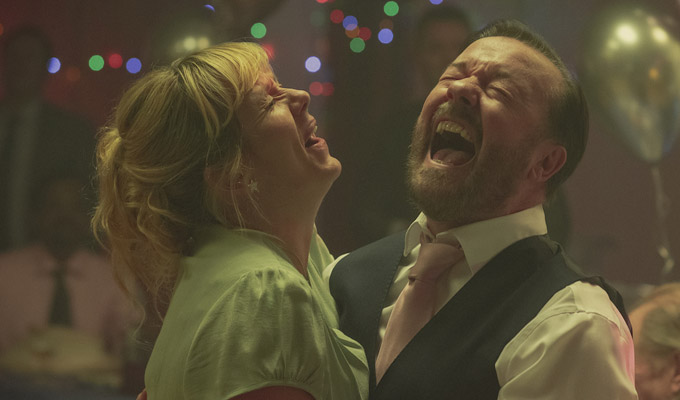
After Life series two
Note: This review is from 2020
TV review by Steve Bennett
Given he’s known for brutally direct stand-up, it’s little surprise that Ricky Gervais doesn’t do subtext. But his approach proves a very blunt tool, especially when tackling the big issues of grief and depression on which After Life is built, leaving a show that struggles with nuance.
In the second series of the hit Netflix sad-com, which dropped today, the comedian’s character Tony remains understandably floored by the death of his wife Lisa, his redemption at the end of series one doing nothing to fill the yawning hole in his soul. He pines for her by rewatching old home videos, numbing the pain with alcohol.
Lest there be any misunderstanding, he tells his colleague Lenny (Tony Way): ‘I’m just feeling sorry for myself and guilty about that’ and that he’s ‘in pain but getting better every day’.
What happened to that mantra of screen storytelling, show, don’t tell? It’s ignored here as Tony explicitly gives voice to his every feeling, whether to co-workers, to his graveyard buddy Anne (Penelope Wilton), or to his useless psychiatrist, played by Paul Kaye – and usually underscored by sad music to ram the point home.
Much of the script is a monologue showing Gervais thinking through grief, but in a very direct way, straining just that bit too hard to prove he’s an auteur who can do sad and serious, not just flippant comedy. Meanwhile, some characters, that therapist or Diane Morgan’s paranormal-believing Kath, seem largely there just to provide a point for him to argue - again very literally - about.
Yet, as with series one, the heavy-handed dramatic elements are leavened with outlandishly funny comedy scenes, very often thanks to the brilliant Joe Wilkinson, playing to type as the grubby postman Pat. By far the best scene in episode one involves him making a house call on Tony, though the gag featured prominently in the trailer.
The other best things about the show are Kerry Godliman’s perfect portrayal of Lisa, warm and jokey and human, and Roisin Conaty’s whirlwind of a carefree sex worker Daphne. The relationship lined up between her and Pat is one worth following.
Episode one features a couple of other comic scenes. The one with Tony interviewing a 100-year-old isn’t specially clever, but seeing Annette Crosby, known for playing the endlessly patient Margaret Meldrew, spray out c-bombs as she resents every moment of her long existence is brutally effective.
Gervais, though, overuses the freedom Netflix lends to be as foul-mouthed as he likes, with the same blunt expletive providing a payoff to a meditation scene, featuring Seb Cardinal as the sniffling yogi, that doesn’t deliver on its promise.
It’s hard to avoid coming to the same verdict for the series as a whole, even though there are enough moments of comic quirk to keep it intriguing.
However despite, or perhaps because of, Gervais’s way of semaphoring every feeling with little subtlety, the first series of After Life was phenomenally successful, and there’s no denying this repeats that winning formula. If you liked the first run, fill your boots.
But for a nuanced, often laugh-out-loud Netflix comedy with complex, screwed-up but relatable characters dealing with depression and more, Gervais comes a poor second to a cartoon horse.
• After Life series two is on Netflix now.
Review date: 24 Apr 2020
Reviewed by: Steve Bennett









